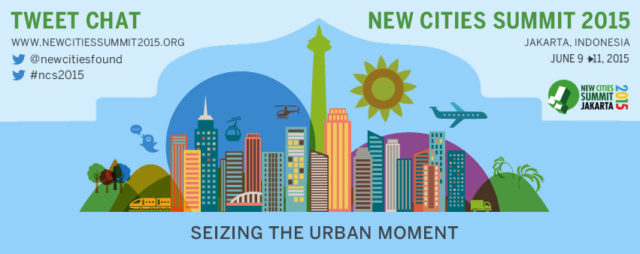Tweet Chat Recap: Seizing the Urban Moment
janvier 29, 2015 — Uncategorized
This is the Urban Moment because for the 1st time, most humans live in cities – the world’s most creative places
Simon Kuper, columnist, the Financial Times – @KuperSimon
On Wednesday, 28 January, we launched our monthly 2015 Tweet chat series, tied to our New Cities Summit in Jakarta (June 9 – 11). A dynamic mix of international guests joined us for this inaugural Tweet chat, which unpicked the key issues bound up in the Summit’s theme, ‘Seizing the Urban Moment’.
Rethinking transport, promoting parks and walking, triggering better public/private participation, harnessing technology and nurturing creativity – these were some of the themes we tackled during the thought-provoking, hour-long conversation on Twitter. All Tweets were tagged with our Summit hashtag, #ncs2015.

Seizing the Urban Moment Tweet Chat Highlights
Below is a glimpse at some of the insights and ideas shared during the chat.
Why is now the time for us to Seize the Urban Moment?
Majority of the world’s pop. is now in cities. National governments are facing limits to their power to govern. Cities rising up. @SenseableCity
66% of world population will be urban by 2050. 90% of this growth will be in developing countries. Biz as usual will be detrimental. @EMBARQIndia
It’s time to seize the urban moment because 21st century is an urban century. The world’s future is with our urban areas. @dedenrukmana
Many cities are already at a crisis point and require immediate interventions to be inclusive and liveable. @SarahKMoser
How can public and private collaborate to seize the urban moment?
Public private partrnerships depend on sharing data, which will allow for real innovation to solve our newest city problems. @agfpim
Creating #collaborative space between the public and private sector for the development of urban researches, analysis and proposals. @EMBARQIndia
Transparency will always be an important aspect. Pop must have access to real indexes to support solutions.@USP_Cidades
What are the priorities for Asian cities like Jakarta over the next decade?
Asian’s rapid #urbanization provides opportunity to leapfrog unsustainable development patterns found http://ow.ly/HVnw7. @Connect4Climate
Two priorities for Jakarta over the next decade: developing mass transit, and mitigating annual floods. @dedenrukmana
Providing low income housing and basic need infrastructure for them in other restructuring metropolitan cities#ncs2015. @cesa_yusri
Priorities for Jakarta: better planning, conserve open space, pursue proposed SDG Goal 11. @Genie_Birch
Gridlock and pollution: how can we combat these obstacles to healthy, green cities?
Walk, ride, take the bus, hop on a train, anything but just you in your car – solo. @GBCSA
Robust public transit solutions like #Panama & #Singapore help alleviate congestion. http://on.citi.us/13W1eQ0 #citiforcities. @Citi
BIG DATA & Analysis – make use of the information we are generating to reveal opportunities & make improvements.@TimJWhitcombe
“More” is not the answer; solution is to be smarter. Less asphalt and more silicon could help use existing infrastructure.@SenseableCity
How can cities harness tech in new ways?
Real time information and public participation role in development would be interesting to see…@Christianmcoop
Use #tech to get individuals in touch with how much they are personally consuming in water /electricity/ waste – change behaviour. @GBCSA
Mobile phone as the “remote control” for city services. Location enabled, and two way info channel!@MatthewSpGeorge
Encouraging education of #tech gives the power of creation to people closest to the community. @nextdrop
How can culture help cities seize the urban moment?
People can increasingly choose where they live. They want to live in fun cities. Culture lures inhabitants. @KuperSimon
#Culture has the potential to connect citizens in ways smartphones can’t event dream about. @neilmac89
Artists can highlight issues in new, non-confrontational way, which helps us see issues from a new perspective.@agfpim
Our Featured Guests included:
- Citi, New York, @Citi
- Sarah Moser, Professor, McGill University, @SarahKMoser
- Alistair Pim, VP Business Development & Alliances for Smart Cities, Schneider Electric, @agfpim
- Ivan Bruce, Consultant, Connect 4 Climate, @Connect4Climate
- Dr Eugenie Birch, Professor, PennIUR, @Genie_Birch
- Anthony Vanky, Strategist, MIT SENSEable City, @SenseableCity
- Christian Coop, Design Director at NBBJ, @Christianmcoop
- Tim Whitcombe, Architect and Designer at NBBJ, @TimJWhitcombe
- Dr Thomas Holderness, Principle Investigator at PetaJakarta and SMART fellow, @iHolderness
- USP Cicades, São Paulo, @USP_Cidades
- Simon Kuper, Columnist for the Financial Times, @KuperSimon
- Deden Rukmana, Associate Professor of Urban Studies and Planning at Savannah State University, @dedenrukmana
- Cesaria Sri Hastuti, Sub-section Head of Program, Dept. of Environmental Services at the city of Yogyakarta, @cesa_yusri
- Green Building Council of South Africa, @GBCSA
- Divya Kottadiel, Editor of TheCityFix, @EMBARQIndia
- Quijano Flores, Co-founder of NextDrop, @nextdrop
- Elisa Sutanudjaja, UNESCO Program Officer and Founder of the Rujak Centre of Urban Studies, @elisa_jkt
- Matthew George, Founder of Bridj, @MatthewSpGeorge
- Laurent Vermeesch, City Blogger and Journalist at Brussel Nieuws, @thecitygeek
- Samuel Roumeau, Ouishare Bordeaux Connector, @SRoumeau
- Neil Mac Lean, Previous NCF staff, @neilmac89
- Intan Anggita, Indonesian Blogger, @Badutromantis
- Alix Armour, Co-founder, Nimble Scooters, @Aliks
- Shafiq Pontoh, Chief Strategic Officer at Provetic, @ShafiqPontoh
Thank you!
Thanks to all our featured guests, and to the many others that joined in on Twitter. We hope you’ll join us again for our next Tweet chat session. For a full view of the conversation, check out our post on Storify.
To find out more about the New Cities Summit, visit newcitiessummit2015.org and follow #ncs2015 on Twitter.
